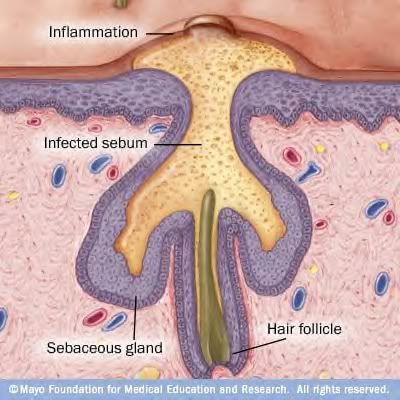What is Acne?
Acne is a disease that affects the skin’s oil glands. It occurs when the pores of the skin become clogged with oil, dead skin cells, and bacteria. Blackheads, whiteheads, pimples, and even deeper lumps such as cysts or nodules are all different types of acne. The most common places that acne occurs are: the face, neck, back, shoulders, and upper arms. Acne vulgaris, the medical term for common acne, is the most common skin disease there is. It affects nearly 17 million people in the United States. Nearly 85% of people develop acne at some time between the ages of 12-25 years. However, the disease is not restricted to any age group; adults even into their 40s can get acne. Up to 20% of women develop mild acne. It is also found in some newborns.
While acne is by far not a life threatening disease, acne can be upsetting and disfiguring. In some severe cases, acne can lead to serious and permanent scarring. Even some less severe cases can lead to some scarring.
Common types of Acne
Whiteheads: White heads result when a pore is completely blocked, trapping oil (sebum), dead skin cells, and bacteria, causing a white appearance on the surface of the skin. Whiteheads are normally quicker in life cycle than blackheads.
Blackheads: Blackheads result when a pore is not completely blocked, but partially blocked, allowing some trapped oil (sebum), bacteria, and dead skin cells to slowly drain to the skin’s surface. A reaction of the skin’s pigment, melanin, with the oxygen in the air causes the blackhead’s black color. Blackheads can often take a long time to clear.
Pustules: Pustules are similar to whiteheads, but they become inflamed, and appear as a red circle with a white or yellow center. Pustules are great examples of a common zit.
Papules: Papules are inflamed, tender, red bumps with no head. Unlike other types of acne, papules can not be popped, and an attempt to pop would do no good, and may exacerbate scarring.
What are some of the causes of Acne?
Although the exact cause of acne is unknown, but doctors believe it results from several related factors. One important factor is rising hormone levels. These hormones, called androgens (male sex hormones), increase in both boys and girls during puberty and can cause the sebaceous glands to enlarge and make more sebum. Another factor is heredity or genetics. Researchers believe that the tendency to develop acne can be inherited from parents. For example, studies have shown that many school-age boys with acne have a family history of the disorder.
Several factors can contribute to the cause of acne or make it worse. Changing hormone levels in girls and women may cause a flare in their acne 2 to 7 days before their menstrual period starts. In addition, certain drugs, including androgens, lithium, and barbiturates, are known to cause acne. Greasy cosmetics may alter the cells of the follicles and make them stick together. Friction caused by leaning on or rubbing the skin or the pressure from bike helmets, backpacks, or tight collars can contribute to or worsen acne. Also, environmental irritants (such as pollution and high humidity), squeezing or picking at blemishes, and hard scrubbing of the skin can make acne worse.
Myths About the Causes of Acne:
There are many myths about what causes acne. One very common myth is that chocolate and greasy foods cause acne. Research has shown that foods seem to have little effect on the course and development of acne in most people. Another very common myth is that dirty skin causes acne; however, blackheads and other acne lesions are not cause by dirt.
Now that you know what acne is you should try this Proven Acne System


3 comments:
The useful information about acne curing is given on this website. Information about the acne recovery centers and what precautions should be taken by the patients to overcome acne is given on this site.
http://www.treatmentsforacne.net/skincarebytype/Acne-Treatment/index.htm
Often individuals who do not consume a healthy diet or whose diet lacks the proper amount of critical vitamins and minerals suffer from acne problems. baby eczema
Post a Comment